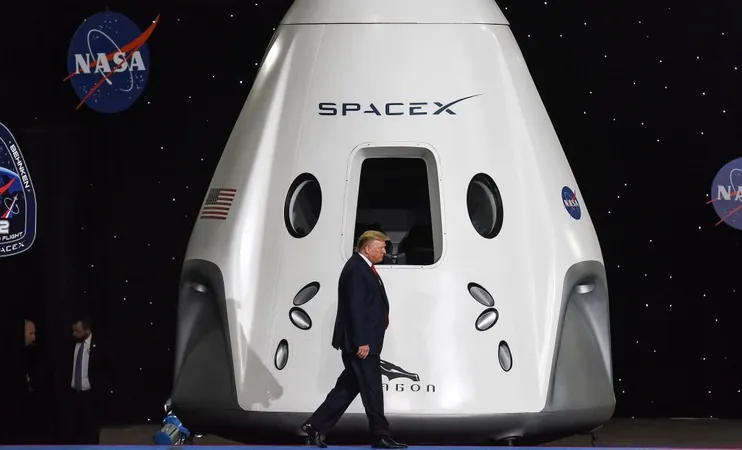
The Future of NASA Under President Trump's Second Administration: Key Changes Ahead?
2025-01-20
Author: Liam
Introduction
As President Trump returns to the White House, a wave of speculation is sweeping across the space industry regarding how his administration will significantly alter NASA's trajectory and the broader space sector. With potential shifts in priorities and funding, the coming months promise to be pivotal for America's exploration efforts.
The Artemis Program's Future
One of the most contentious issues is the future of the Artemis program, aimed at landing humans on the Moon once again. Initiated during Trump's first term and carried forward by the Biden administration, Artemis has faced serious delays and technical challenges. Recently, Elon Musk, head of SpaceX and a crucial supporter of Trump's election efforts, stirred up debates by stating that "the moon is a distraction," advocating for a direct focus on Mars. However, many experts believe such a drastic move could face considerable resistance, particularly from Congress, which is keen on a balanced approach that encompasses both lunar and Martian missions.
Marcia Smith, founder of SpacePolicyOnline, emphasizes that "Congress wants a moon-to-Mars program, not one or the other." This tension highlights the delicate balance of U.S. priorities in space, especially as international competitors like China pursue their moon ambitions with the International Lunar Research Station (ILRS).
The Space Launch System's Fate
The fate of the Space Launch System (SLS), NASA's ambitious megarocket designed for crewed moon missions, is also in jeopardy. Criticism over ongoing delays and costs has led to discussions about potentially scrapping or downsizing the SLS in favor of more cost-effective, commercial alternatives like SpaceX's developing Starship. While some components of the SLS may be cut, Smith asserts that the rocket's core support in Congress makes its overall cancellation unlikely.
Leadership Changes at NASA
Adding to the uncertainty is the anticipated nomination of Jared Isaacman, the billionaire tech entrepreneur known for his SpaceX missions, to lead NASA. While this nomination has garnered support, it is not without controversy, given Isaacman's past political donations to Democrats. His leadership style could foster a new era for NASA, though he will need to navigate the pressures and directives from Congress carefully.
The U.S. Space Force and Budget Debates
Another crucial topic on the administrative agenda is the U.S. Space Force, which was initiated under Trump in late 2019. Its funding and potential relocation from Colorado to Alabama are expected to spark fierce debates, as different factions within Congress push for vastly different budget priorities.
Scientific Inquiry and Budget Cuts
On the scientific front, the administration may eye significant cuts to climate and Earth science programs at NASA. In Trump's previous term, there was a notable push to limit funding for these initiatives, but Congress consistently pushed back. Observers are keenly watching how these dynamics will evolve, particularly as discussions on broader environmental policies heat up.
Conclusion
Ultimately, the new Trump administration appears poised for both tumult and transformation in overseeing NASA and the U.S. space sector. The debates around Artemis, the SLS, the emerging role of commercial players like SpaceX, and the prioritization of climate science represent a balancing act that will have far-reaching implications for the future of American space exploration. As we stand on the brink of this new chapter, the stakes couldn't be higher. Will Trump's second term lead to groundbreaking advancements or derail vital scientific pursuits? Stay tuned for what's shaping up to be a thrilling journey in space policy!









 Brasil (PT)
Brasil (PT)
 Canada (EN)
Canada (EN)
 Chile (ES)
Chile (ES)
 Česko (CS)
Česko (CS)
 대한민국 (KO)
대한민국 (KO)
 España (ES)
España (ES)
 France (FR)
France (FR)
 Hong Kong (EN)
Hong Kong (EN)
 Italia (IT)
Italia (IT)
 日本 (JA)
日本 (JA)
 Magyarország (HU)
Magyarország (HU)
 Norge (NO)
Norge (NO)
 Polska (PL)
Polska (PL)
 Schweiz (DE)
Schweiz (DE)
 Singapore (EN)
Singapore (EN)
 Sverige (SV)
Sverige (SV)
 Suomi (FI)
Suomi (FI)
 Türkiye (TR)
Türkiye (TR)
 الإمارات العربية المتحدة (AR)
الإمارات العربية المتحدة (AR)